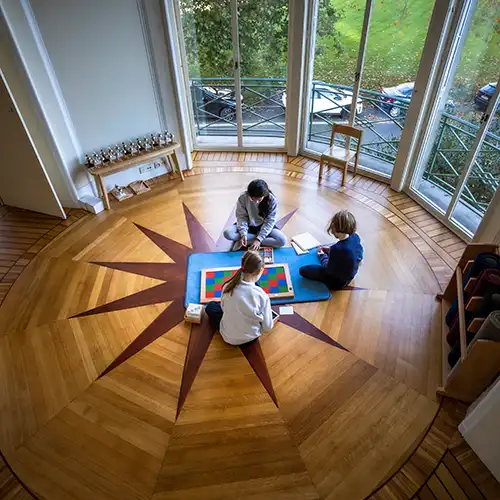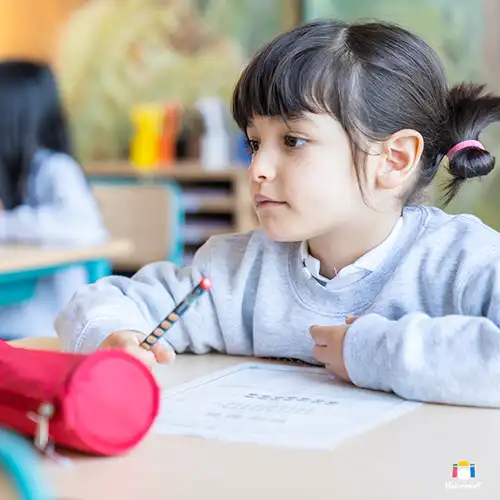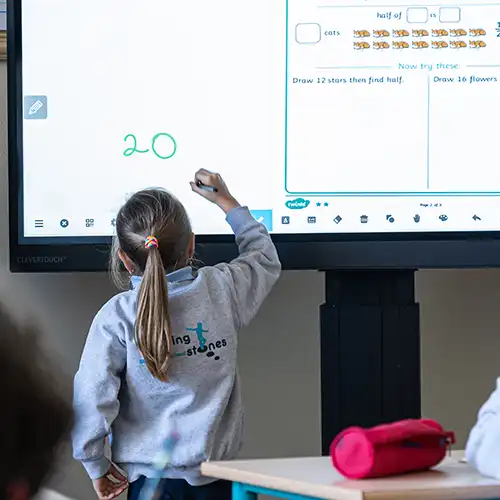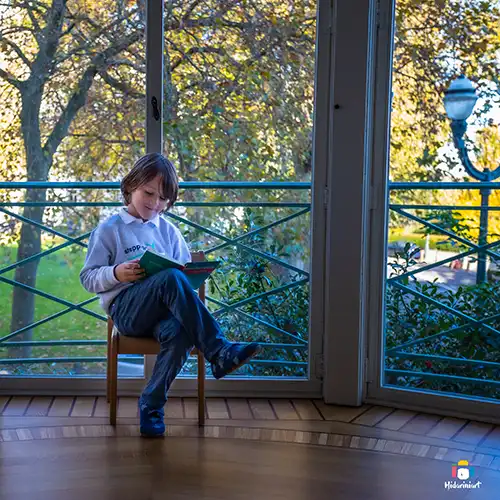Kindness, Autonomy, Curiosity
Competency building

As primary language training is conducted through immersion, children undertake daily oral language practice in French and English, with each language assigned equal teaching time. Teachers in both languages intervene in their discipline and also teach cultural, artistic and scientific topics in their assigned language.
Dutch is introduced to the children in the third year of primary school and taught according to the academic requirements set by the Wallonia-Brussels Federation (see ‘Useful Links’ for more details).
At Stepping Stones Primary school, we want to enable the child to learn and respond to new information and situations through experimentation; the development of logical thinking and the acquisition of knowledge across all areas. The use of observation, experimentation and discussion aids children with the acquisition and consolidation of their knowledge.
Each learning activity that a child undertakes contributes to the development of a specific and easily identifiable competency. At our school, competency building is based on the combination of our three pedagogical approaches: Montessori, collaborative approach and traditional approach. Our teachers not only cultivate the child’s interest in all areas but also give them the appetite to discover and experience new things
Throughout the learning journey at Stepping Stones Primary, linguistic skills in French and English are honed through reading, writing and speaking. Moreover, our combined and innovative pedagogical approach supports our pupils to master the languages and also to study and understand their functions, structures and grammatical principles.
Our curriculum in mathematics supports the child’s development in numeracy, calculus, problem-solving, geometry and number comparisons. To learn maths, our students benefit from teacher-led sessions as well as Montessori sessions. Our teaching methods are conducive to the development of logical thinking and enable the child to practically apply concepts as well as understand mathematical theories.
A good grounding in historical education helps children develop an understanding of the past, which enables them to investigate and relate to events in their communities as well as the wider world. At Stepping Stones Primary we use chronological timelines and story-telling about major historical landmarks/milestones to provide context and support each child’s comprehension about history.
At Stepping Stones Primary, geographical education is concerned with developing the child’s understanding and appreciation of the world in which they live. Through the exploration of the environment, the children will learn and develop their understanding and awareness of the world around them using a range of investigative and communication skills which we will explore during our weekly outings.
Our history and geography lessons are dynamic and updated on an annual basis by our teachers to keep them relevant and exciting for the children!


We believe that early awareness of the main concepts of computer science and technology is essential. It will enable children to understand the world around them and lay the foundation for further development at secondary school. The school will teach the fundamental concept of computing as set out by the Wallonia- Brussels Federation.
Visual arts, the history of art and music are integrated into the weekly timetable and play a critical role in the expansion and consolidation of knowledge. Thus, art and culture are an integral part of the programme at our primary school. From the first year, the layout of the Montessori classroom includes areas dedicated to the development of artistic creativity and the discovery of musical writing. The discovery of arts is integrated in our weekly outings
Physical activity (exercising) is a fundamental part of child development and well-being. At Stepping Stones Primary we aim for each child to acquire not only a taste for sport but also to value the relationship between physical effort and well-being. Our programme at school includes a term of swimming which takes place at the communal swimming pool.
Physical education sessions are scheduled for two hours per week with a specialized teacher as required by the Wallonia Brussels Federation. Furthermore, activities outdoors strongly contribute to the physical wellbeing of each child; and include sporting challenges as part of the program.
